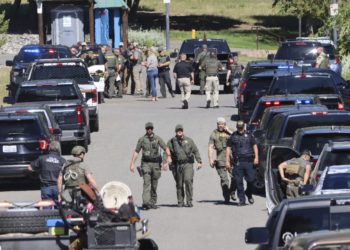Feuding members of the world’s most-feared fentanyl cartel, reeling from internal war and a crackdown by Mexico and the United States, have forged a desperate alliance with a rival gang, threatening to transform the criminal underworld across dozens of countries.
The cartel, the Sinaloa Cartel, has for years run a global empire built through alliances with criminal groups and affiliates from the Americas to New Zealand — reaping millions of dollars from smuggling drugs like fentanyl at a devastating toll, especially in the United States.
But the cartel has for months been torn by violence between two main factions, as Mexico, under pressure from the Trump administration, has moved aggressively against it.
In that turmoil, a faction of the cartel led by sons of the drug lord known as El Chapo have allied with an old and powerful adversary, the Jalisco New Generation Cartel, according to four people familiar with the matter. The risky move by El Chapo’s sons could ultimately turn the Jalisco cartel into the world’s biggest drug trafficker — a shift that could potentially redraw alliances and power structures across international drug markets, analysts say.
“It’s like if the eastern coast of the U.S. seceded during the Cold War and reached out to the Soviet Union,” said Vanda Felbab-Brown, an expert on nonstate armed groups at the Brookings Institution. “This has global implications for how the conflict will unfold and how criminal markets will reorganize.”
Tapping into the financial muscle, fentanyl expertise and international reach of El Chapo’s sons could bolster the Jalisco cartel’s global ambitions and help cement its dominance in Mexico, said Eduardo Guerrero, a security analyst.
“It’s like bringing Messi to your football team,” said Mr. Guerrero, referring to the Argentine star Lionel Messi. “Combining both forces will mean having an enormous global production capacity.”
But this reshuffling of Mexico’s criminal map is likely to ignite several major regional wars between competing groups, he added.
Burning through resources and suffering casualties, El Chapo’s sons, called Los Chapitos, have sought help from the Jalisco cartel in recent months, handing over territory in exchange for money and weapons.
The alliance, described by two high-level operatives of the Sinaloa Cartel and two people in the United States with knowledge of the matter, is itself a sea change. The Sinaloa and Jalisco cartels had waged a bloody, yearslong turf war across Mexico, terrorizing millions of people in the process.
The twist in the drug war underscored not just the back-stabbing nature of the cartels’ trade, but also how traffickers are adapting to the Trump administration’s aggressive push against them. The United States has put intense pressure on Mexico to curb the flow of fentanyl, and those efforts, combined with the cartel infighting, have pushed two criminal adversaries together.
Mexico has moved aggressively against fentanyl trafficking in recent months, deploying thousands of troops to the Sinaloa Cartel’s home state. The Trump administration has lauded its own efforts, asserting that seizures at the U.S.-Mexico border have dropped 30 percent.
Operatives affiliated with the cartel put themselves in danger by speaking to The New York Times and spoke on the condition of anonymity for fear of retaliation.
One high-ranking member of the Sinaloa Cartel said Los Chapitos were in desperate need of funds, reeling from financial losses caused by the disruption to fentanyl production and staggering deaths within their ranks.
“Los Chapitos were gasping for air, they couldn’t take the pressure anymore,” he said. “Imagine how many millions you burn through in a war every day: the fighters, the weapons, the vehicles. The pressure mounted little by little.”
The war within the Sinaloa Cartel grew out of a fracture between two main groups. Those who follow the sons of Joaquín Guzmán Loera, the Sinaloa leader known as El Chapo, are often called Los Chapitos, like their leaders. Their rivals follow Ismael Zambada García, another founder of the Sinaloa Cartel who is known as El Mayo.
A major sign of Los Chapitos’ weak position is that they would give up territory in exchange for support from the Jalisco cartel. Such a trade would severely weaken the Sinaloa Cartel because territory is crucial to secure trafficking routes.
The alliance took months to materialize, as both sides worked to hammer out the details — sometimes meeting in neutral zones outside their disputed territories, and even outside the country, according to the two cartel operatives.
“It’s like if the U.S. and China need to reach a deal,” said one high-level operative. “The Chinese won’t want to go to the United States and the Americans won’t want to go to China, so it takes time to determine where to hold the meetings and who goes.”
The decline of the Sinaloa Cartel has also been accelerated by a recent, concerted effort by the Mexican government to crack down on it, especially in Sinaloa State. Hundreds of additional Mexican troops have been sent there, and lab raids, arrests and drug seizures make headlines every week.
But so far, the Sinaloa Cartel has received outsize attention. The rest of Mexico has not seen the same government effort, and cartel operatives said they had moved most fentanyl production to other states to avoid detection.
“It’s a good thing to dismantle these groups but it’s almost impossible to achieve a sustained disruption in drug flows,” said John Creamer, a retired American diplomat who served in U.S. embassies across Latin America, most recently in Mexico.
“You can never truly put a stake through the heart of an entire cartel,” he said. “You can disrupt and create chaos for them, but the drug trade always bounces back. That’s what makes the drug war so frustrating.”
The current infighting began when Joaquín Guzmán López, a Chapito, betrayed his father’s longtime partner, Mr. Zambada. The younger Mr. Guzmán kidnapped Mr. Zambada and flew him over the border into the custody of U.S. federal agents last summer.
The power struggle that ensued has left more than 1,300 people dead and more than 1,500 missing in Sinaloa State, according to official data and local search groups, and the violence has not relented.
Three people were brutally killed this month in a single afternoon in separate events in Culiacán, the state capital. One man was found dumped on the outskirts of the city, blindfolded, hands bound behind his back, bearing signs of torture.
The following day, a father and son were ambushed while driving through a busy thoroughfare. The father died at the scene and the son was critically wounded, their car struck by at least 50 high-caliber rounds.
A fruit vendor eagerly set up at the crime scene, with soldiers lining up to order lemonade and other drinks under the baking sun.
As a forensics team pried the victim’s body from the driver’s seat and zipped it into a body bag, guttural cries rose from his nearby family, sobbing and holding each other.
The vendor told a reporter that this was his first good bout of business in months. So many people had fled Culiacán because of the violence that the streets were empty of customers.
“But my hands are trembling,” he said, asking to remain nameless because of the violence. “I don’t want to sell like this.”
Maria Abi-Habib is an investigative correspondent reporting on Latin America and is based in Mexico City.
Alan Feuer covers extremism and political violence for The Times, focusing on the criminal cases involving the Jan. 6 attack on the Capitol and against former President Donald J. Trump.
The post Cartel Fighters Make a Desperate Alliance That Could Transform Underworld appeared first on New York Times.




